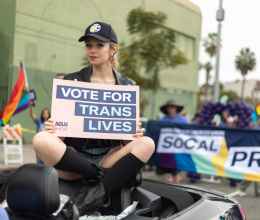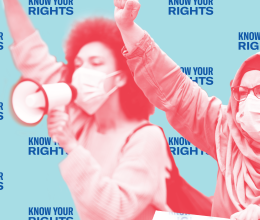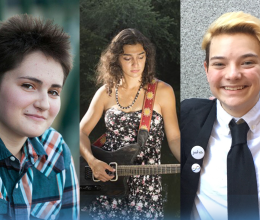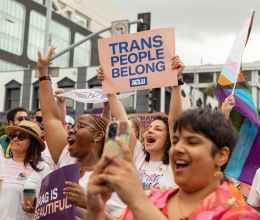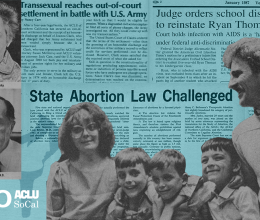Like countless other young women, Monica Jones fixed her hair, applied her make-up, put on a dress and set out on foot for an evening at a neighborhood bar in Phoenix. Along the way, Monica, a social work student, attracted the attention of two men in a car. They pulled over, flirted with her and offered her a ride to the bar. She accepted.
Before she knew it, Monica was under arrest, accused of being a sex worker.
The two men, who were undercover cops, arrested Monica for "manifesting prostitution" on the grounds that she was wearing a tight-fitting dress while walking through her own neighborhood, an area known for prostitution. But Monica knew the harsh truth that officers profiled her as a sex worker that weekend night in 2013 because she is a Black, transgender woman. Monica challenged her charge, and an appeals court overturned her arrest and conviction.
While Monica was ultimately exonerated–after nearly two years of legal battles, many other transgender women of color along with LGBTQ people (cisgender and transgender alike) are routinely profiled or targeted by law enforcement for sex work-related arrests because of their sexual orientation, their gender non-conformity and their transgression of gender stereotypes.
Women like Monica are frequently arrested for sex work for simply “walking while trans” – going about daily routines like walking to the grocery store, coming home from work or school, waiting at a bus stop or daring to wear a tight dress on an evening out. In a survey of Latina, trans women in Los Angeles, 60 percent said they were profiled by officers. At a community forum in New York, nearly all 200 transgender attendees reported the same experience.
Unsurprisingly, the U.S. Department of Justice has found that some major police departments practice biased and unlawful profiling of trans women as sex workers based solely on appearance – violations of the right to be free of gender discrimination and First Amendment protections for freedom of expression.
Gay men and LGBTQ youth, particularly those who are gender non-conforming and homeless, are similarly targeted. Police use laws prohibiting "public lewdness" and "solicitation" to discriminatorily target gay men who are cruising in public places for private and consensual sex partners, mainly by posing as undercover gay men, flirting with and entrapping unsuspecting victims – again, violations of equal protection under the law.
For example, courts found that the Long Beach police department illegally targeted only gay men while “allowing those interested in engaging in [lewd] heterosexual sex acts to proceed unfettered.” Further, a 2011 study found that LGB youth were 53 percent more likely to be stopped by the police, 60 percent more likely to be arrested before the age of 18, 90 percent more likely to have had a juvenile conviction and 41 percent more likely to have had an adult conviction than their heterosexual peers–when controlling for race, socioeconomic status and criminal behavior.
Worse still is the situation for transgender and cisgender women who engage in sex work. They are disproportionately targeted for arrest because of their gender and failure to conform to stereotypes about how women should look and behave. Their male customers, on the other hand, are rarely charged – California data on prostitution related arrests in the last year and over a 10-year period reveals the same alarming gender disparity: two-thirds of those arrested are women but only one-third are men.
The ACLU has long opposed the criminalization of sex work because we believe the Constitution protects the rights of consenting adults to engage in private, consensual sexual activity without fear of criminal penalty. In other words the Constitution protects an adult’s personal decision to engage in intimate, sexual activity with another adult whether the intimacy is built on love, desire or done in exchange for money or other things of value like shelter, food or necessities. At a minimum, restrictions on that right must receive a high level of constitutional scrutiny before they can be allowed to stand.
The ACLU and an array of civil rights, legal and social services organizations argue these points in a friend-of-the-court brief filed last week with the Ninth Circuit Court of Appeals, which is hearing a constitutional challenge to California’s statute that prohibits solicitation and engagement in sex work for both buyers and sellers of sex.
Precedent supports our argument. In 2003, the Supreme Court struck down sodomy laws as unconstitutional. That ruling was based on three important principles that consenting adults have:
- the right to private sexual intimacy,
- the right to form and make decisions about intimate relationships that are sexual in nature and
- the right to privately engage in intimate conduct in one’s own bedroom.
The court recognized “an emerging awareness that liberty gives substantial protection to adult persons in deciding how to conduct their private lives in matters pertaining to sex.” It also said that the “state cannot demean [people’s] existence or control their destiny by making their private sexual conduct a crime.” We believe all these principles apply to an adult’s personal decision to engage in sexual activity with another adult in exchange for money, shelter, food or necessities. As the sodomy ruling–as well as the Supreme Court’s marriage equality ruling–make clear, moral disapproval of certain conduct–including sex work–alone cannot justify its criminalization.
Discriminatory enforcement of sex work-related laws also exposes LGBTQ people and women to much higher rates of violence at the hands of police. Transgender people are nearly four times more likely and transgender people of color six times more likely to experience physical and sexual violence from the police. A 2014 survey showed that 59 percent of transgender youth and 12 percent of LGB youth had been asked by law enforcement officers for sexual favors, and 50 percent of transgender youth and 22 percent of LGB youth reported being called slurs by law enforcement.
Joining us in our friend-of-the-court brief is a broad coalition of groups who also care deeply about the discriminatory enforcement of sex work laws and serve people negatively impacted by laws that criminalize sex work: API Equality-LA, Bienestar, Black Women for Wellness, California Rural Legal Assistance, Inc., California Women’s Law Center, Equality California, Familia: Trans Queeer Liberation Movement, Free Speech Coalition, Gender & Sexualities Alliance Network, Gender Justice LA, Justice Now, Los Angeles LGBT Center, National Center for Transgender Equality, Transgender, Gender Variant, Intersex Justice Project, Translatin@ Coalition, Transgender Law Center and the Transgender Service Provider Network.
We hope this brief sends a strong signal to the court that it should apply a high level of constitutional scrutiny to California’s criminal statute penalizing solicitation and sex work and bear in mind the dark history and the current reality of discriminatory enforcement as it considers the case. More generally, courts may start to more deeply examine how laws used to ensnare suspected sex workers are discriminatorily enforced on the ground.
As the Supreme Court said when it recently struck down laws banning same-sex couples from marrying, “the nature of injustice is that we may not always see it in our own times.”
Melissa Goodman is director of the LGBTQ, Gender & Reproductive Justice Project at the ACLU of Southern California and Maria Carmen Hinayon is UCLA POP law fellow at the ACLU of Southern California.

